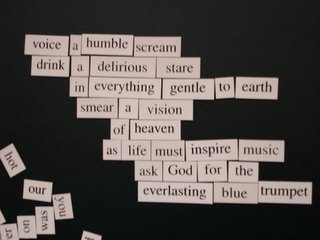This poem was group inspired by Allison, Seth, Stephen and myself. ( words were limited to the magnets that were available to us!)
I seem to have this ability/gift that comes and goes called poetry. I have tried to read about it. I have tried to produce it on my own and yet the only time I feel it is any good at all is when it flows from me out of some kind of inspiration. I have only started sharing some of my poetry in the last couple of years. It usually is too personal to share. I often wondered what is it good for? What is it’s purpose? Other’s have tried to answer my question to no avail and in the end I figure it is just for my personal reflection or edification.
In my study for my sermon this Sunday….which was snowed out! I came across and interesting commentary on Numbers 11:25:
“Then the LORD came down in the cloud and spoke with him, and he took of the Spirit that was on him and put the Spirit on the seventy elders. When the Spirit rested on them, they prophesied, but they did not do so again.”
The commentary is Commentary on the Torah by Richard Elliott Friedman. On page 463 I read the following: “ Numbers 11:25. “They prophesied.” What exactly do they do ? Prophecy in the Bible does not primarily involve prediction. It is not that they are going about telling the future. What is happening that makes it obvious to Moses, Joshua and apparently everyone that they are doing something that is associated with prophets? Some suggest that they are in some sort of trance, but trance behavior is not generally part of what is pictured in the fifteen books
Of the prophets in the Tanak or in the case of prophecy in the Tanak’s narrative books. What is typical of prophecy, as opposed to historical narrative, in the Bible is that prophecy is in poetry ( or combinations of poetry and prose).
Biblical prophecy has the characteristics of oral formulaic poetry. That is, the prophet composes on the spot, using lines that he or she has already composed and memorized, and mixing these “formulas” with new lines that occur to him or her spontaneously. When such poems occurred to ancient poets, the poet must have felt inspired. And people who watched and listened to them must have perceived them to be inspired as well. When a man spontaneously says
They’ll beat their swords into plowshares
And their spears into pruning hooks
A nation won’t lift a sword against a nation,
And they won’t learn war anymore.
We can easily imagine him and his audience feeling that it is God moving through him. Further evidence that they are doing something musical or poetic comes from the other most famous biblical instance of such group prophesy : King Saul joins in a group of prophets, he prophesies with them, which astounds everyone. And in that case the text notes that these prophets are accompanied by musical instruments. ( 1 Sam. 10:5)
See also the story of Aaron’s and Miriam’s challenge to Moses in the coming chapter. They have experienced prophecy, and they say, “ Has YHWH only spoken through Moses? Hasn’t he also spoken through us? God responds with a declaration about the nature of prophecy, saying that Moses’ experience is different from all others, and the important thing to note here is that the words of God are in poetry ( Num. 12:6-8). (emphasis mine)
Some think that biblical prophecy involved some sort of ecstatic state. That is possible, but it may be more inspired state, both in an Isaiah and in a case like Saul’s or the seventy elders here, in which one who does not normally speak in poetry is now moved and enabled to do so.”
I am not sure what I think of this.
I don’t think that all people who can put a rhyme together have the gift of prophecy. I know that some of my own poetry has been just reflections of what I am seeing and feeling. It’s my way of processing and I don’t think it is prophetic, at least not all the time! ;)
I do know this:
I like the idea of God speaking in poetry.
That he doesn’t find it cheesy or nauseating or useless but
even God is known to speak poetry to those that He loves.
So I walk away from this discovery with this:
Firstly, in my great romance with God, He not only promises to sing over me. (Zephaniah 3:17) but, He may occasionally speak words of poetry to my heart.
Secondly, concerning the purpose of poetry- if it’s relevant and is used by God than that’s good enough for me!



2 comments:
strangely enough, I get the same kind of thing with preaches. If I write one by myself, then they really aren't good. But then other times it's like "bam!" God is talking in my ear and they almost write themselves.
But I love the idea of poetry being for prophets! Go for it!
I agree that we (the preacher) and others (the hearers) can clearly determine the difference between inspired words and a human argument, if you will. I think poetry is all of the things you've pointed out: creative outlet, catharsis, an opportunity to get outside yourself-to speak in a different voice. Prophecy as poetry makes perfect sense. If we could understand the gift of prophecy more fully, maybe we would look for it and desire it more. I like a definition of prophecy given by Dr. Charles Lake:
the ability to proclaim the Word of God with authority and declare its truth in a clear, vital and compelling way.
Preach on prophet poet!
Post a Comment